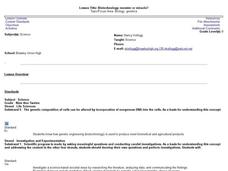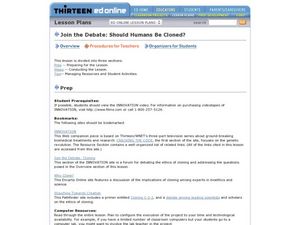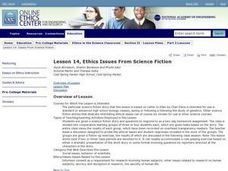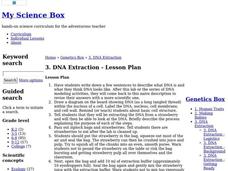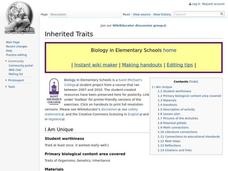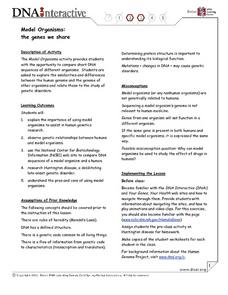Curated OER
Biotechnology: Monster or Miracle
Students explore biotechnology. For this scenario-based lesson, students take a survey on what they know about genetic engineering, view a PowerPoint, and conduct a web quest. Students will then be placed in groups, and produce one of...
Curated OER
Should Humans Be Cloned?
Students explore links on the Internet to collect facts about cloning then prepare an essay on their findings. In this research writing lesson students examine how to include their opinions on what they have found in their research.
Curated OER
Basic Genetics
Ninth graders discover where their physical appearance and personality traits come from. In this genetics lesson, 9th graders learn about cells, chromosomes, DNA and genes. Students discover where genes come from as well as dominant and...
Curated OER
Ethics Issues From Science Fiction
Students analyze ethics issues as they read science fiction works. In this science and ethics lesson, students read science fiction short stories of their choosing, investigate the ethics issues raised in the stories, and present...
Curated OER
DNA Extraction
Students extract the DNA from a strawberry. In this DNA technology lesson, students describe what they think DNA looks like. They use a procedure to isolate and extract the DNA from a strawberry.
Curated OER
GED Vocabulary: Life Science
In this GED life science worksheet, students complete a crossword puzzle given 8 clues about cell division, genetics, and the human body systems.
Curated OER
I Am Unique
Students study traits of organisms including genetics and inheritance. In this genetic traits activity, students complete a shared reading and discuss the 6 traits of uniqueness. Students sort themselves by specific traits and chart...
Curated OER
Plastic Egg Genetics
In this genetics worksheet, students manipulate plastic eggs to discover the genetics of dominant genes. Students combine the various colors and halves of the eggs to complete 6 phenotype graphs of the possible outcomes.
Curated OER
Understanding the Power of Genes
Young scholars research the impacts of genetic research on homes, research laboratories, and hospitals. For this genetics lesson, students use the Internet to investigate the ways that genetics has affected our way of life. They present...
Curated OER
DNA Models
Students construct paper model of the DNA molecule. In this genetics lesson, students assemble paper parts that represent nucleotides into a DNA molecule. Extension ideas are also provided.
Curated OER
Heredity Worksheet: Blood Type
In this genetics learning exercise, students use Punnett squares to determine the possible genotypes of offspring based on blood type. This learning exercise has 6 problems to solve.
Curated OER
Wearing My Genes: Basic Principles of Heredity
Students explore heredity. For this science lesson plan, students examine what heredity is, distinguish the difference between the dominant and recessive genes, explain the difference between phenotype and genotype, and predict the...
Curated OER
Genetic Variations in Hand Span Size
Students study genes. In this biology lesson plan, students measure their handspan size to determine if one pair or many pairs of genes control that trait.
Curated OER
Model Organisms: The Genes We Share
Young scholars gather information about gene banks. In this biology lesson, students work in groups to complete an activity sheet about genetic databases and organism genomes. Lesson includes extension ideas.
Curated OER
Cloning
In this cloning worksheet, learners fill in the blank with information researched about cloning. Students draw a labeled sketch and complete statements for each step of cloning displayed in the noted text.
Curated OER
Cellular Transport and the Cell Cycle
With a multitude of questions, this worksheet offers students the opportunity to review their knowledge about the cell cycle. Question types include true/false, word bank, and completing a table about the differences between interphase...
Curated OER
Mendel and Meiosis
In this meiosis instructional activity, students review vocabulary words associated with genetics, fertilization, heredity, phenotype and genotype. This instructional activity has 6 matching and 9 fill in the blank questions.
Curated OER
Patterns of Heredity
A family tree of dogs guides students through this activity, in which students analyze the pedigree. With a key describing the genetic attributes (tall dominant, short recessive, or male/female), students complete five questions about...
Curated OER
Patterns of Heredity Vocabulary
Test your students' biology vocabulary skills with this review sheet, in which students define twelve different vocabulary terms related to patterns of heredity. Using the word bank provided, 9th graders complete eight sentences with the...
Curated OER
Human Heredity Traits
Completing an idea map based on various inheritance factors and mistakes, 9th graders review their knowledge of genetic disorders. While the activity is based on chapter 15 of an unnamed textbook, the questions at the bottom of the page...
Curated OER
DNA
In this DNA worksheet, 9th graders read a brief excerpt pertaining to the genetic code and identify how proteins know which cell to create. Then they use the genetic code dictionary to draw a diagram showing the codons for an imaginary...
Curated OER
What is Genetics?
In this biology worksheet, 9th graders identify which seed color is dominant in the given chart and explain why it is. Then they create a Punnett square showing the alleles of the parent plants and first generation of offspring.
Curated OER
Genetics Since Mendel
In this biology worksheet, 9th graders describe how two alleles can produce three phenotypes. Then they create a Punnett square showing the possible offspring of red and white cattle. Students also determine the genotypes and phenotype...
Curated OER
Human Genetics
In this biology worksheet, 9th graders create a Punnett square to show the possible offspring of a carrier female and a normal male for color blindness. Then they draw a pedigree for the family and indicate whether the daughter is...


